Early in my career, I thought of academic conferences mainly as professional opportunities. To get a job, one needed presentations and publications. Going to conferences was how one went about this. I started with the College Theology Society’s annual meeting because they seemed to welcome proposals and published an annual volume and the journal Horizons.
From attending conferences over the years, I’ve realized they do so much more than serve professional ends. Here are three reasons for going to an academic conference, reasons I was reminded of at this years’ College Theology Society meeting.
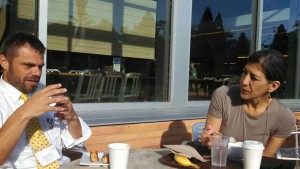 1. You learn things. At conferences, you get to hear research people are working on. I listened to several excellent presentations, including two on Sunday morning from young scholars reflecting on pedagogies that can form people in the virtues. The learning does not just happen at breakout sessions and plenary addresses though. You also learn things from talking to people while you eat breakfast, walk with them across campus, and drink coffee during breaks.
1. You learn things. At conferences, you get to hear research people are working on. I listened to several excellent presentations, including two on Sunday morning from young scholars reflecting on pedagogies that can form people in the virtues. The learning does not just happen at breakout sessions and plenary addresses though. You also learn things from talking to people while you eat breakfast, walk with them across campus, and drink coffee during breaks.
One of the best theological discussions I had was during an evening reception. A small group of us talked sexual ethics as it related to marriage, gay culture, and hookup culture. I learned more in this fifteen minute conversation than I would have learned in several hours of reading essays by myself.
2. You meet people. In one of my first College Theology Society meetings, I was sitting with friends listening to a plenary address on how generational differences affected theological perspectives. The speaker included and spoke favorably about my own post-Vatican II generation, so, at the end of the lecture, my friends and I went down and talked to him. He welcomed us, and the conversation was so engaging that we ended up continuing it in a pub drinking. Where else could one meet an established scholar, especially if one is a newly minted PhD, and talk shop over beers?
It is not just senior scholars though. I got to chat with the people at Daily Theology about their blogging efforts. I know these people, but most of our interactions have been online and within the Catholic blogging community. This was an opportunity that built up friendships by reflecting on the similar work we do.
3. You have fun. One of the reasons why I enjoy the College Theology Society’s annual meeting is that it is full of people who can laugh at themselves. 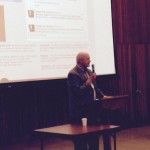 During this year’s presidential report, Bill Portier talked about the great work that people had done to update the CTS website and had it projected behind him. While he was talking though, the society’s Twitter feed (@CTStheology) on the new website was updating and making corrections to what he said. It was surreal and funny, and the whole society had a chuckle.
During this year’s presidential report, Bill Portier talked about the great work that people had done to update the CTS website and had it projected behind him. While he was talking though, the society’s Twitter feed (@CTStheology) on the new website was updating and making corrections to what he said. It was surreal and funny, and the whole society had a chuckle.
Of course, the big fun is the unofficial official evening party. It entails guitars, the greatest rock hits from the 70’s, 80’s, and 90’s. It usually begins with traditional Latin hymns led by Mary Ann Hinsdale. Since she could not make the meeting this year, people coordinated efforts to have her Skype in and lead the singing. These Latin hymns were followed by some Glory & Praise hymns sung by a group of “younger” scholars calling themselves the Saint Louise Jesuit-ettes. It was pure fun.
At their best, academic conferences remind us that theology is more than a profession. Theology is built upon and meant to contribute to the works of others, so it is good to learn things. Theology is rooted in friendship and seeks ways to turn neighbors and strangers into friends, so it is good to meet people. Finally, to be able to do theology is a joyous gift, so it is good to have fun while doing it.
Pictures are stolen from @ReidBLocklin, @DailyTheo, @CatholicEcology, @MaryAnnHinsdale.

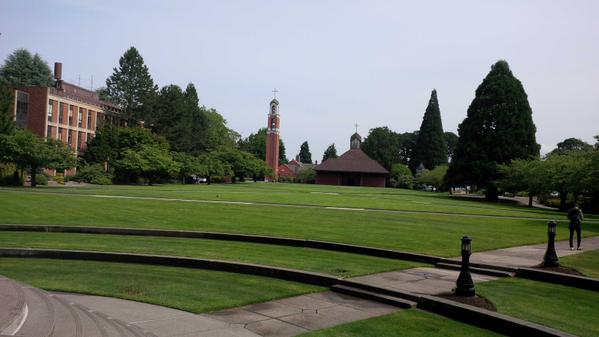
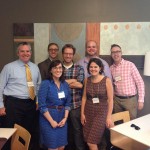
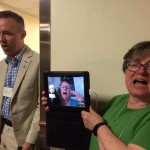


Hi Jason-
We met at the CTSA conference last week. I agree with your statements about the value of conferences’ however, allow me to offer an observation – one that I think that you will appreciate being on the faculty of a Benedictine institution. I have been teaching for 20 years; however, I only earned my doctorate about 5 years ago. I was on the long term-track for studies because I have had at least 2 full-time positions in ministry over the course of the last 16 years. (I am a roman Catholic priest) People like James Hanigan who was a mentor for me has retired as have several others so I don’t have many points of connection at conferences. Ergo, I found myself constantly introducing myself in somewhat superficial situation, not having many people with whom I could establish a longer connection (I know that people who do thane more traditional track have mentors who introduce them to other scholars). I think that we as a catholic community of scholars could be more proactively hospitable – and I am not faulting anyone in particular – but I know working in ongoing formation for clergy, it is important that I connect new priests to the presbyterate in order to feel welcome. I have always experienced this at institutions where I have taught (Mount Aloysius College, St. Mary’s seminary and University, and Saint Francis University – however, I think we could do better on a larger scale. I would, once I would be more connected be willing to work full time at hospitality for CTSA, SCE, CTS, etc…I think it is that important. Community is so key to our human anthropological and moral identity and to our work, it would be helpful to facilitate this as we gather as brother and sister theologians.
Peace… and thanks for the kind exchange at the conference.
Thanks for the comment John. And, you are correct, I do appreciate the emphasis on hospitality. I think we should considered it part of our “professional ethics” in fact. It is so important. I would add too that this is not only good for us as people, but it is also good for scholarship. Ideas and topics are engaged, not in the abstract, but as expressed by people, and this recognition often fosters a hermeneutics of charity. We become more likely to cooperate than criticize.